Daniel Garber talks with filmmaker Matthew Rankin about The Twentieth Century
 Hi, this is Daniel Garber at the Movies for culturalmining.com and CIUT 89.5 FM.
Hi, this is Daniel Garber at the Movies for culturalmining.com and CIUT 89.5 FM.
Photos by Jeff Harris.
It’s the end of the 19th Century, and Canada is still an Imperial backwater. Sir Wilfrid Laurier says “The 20th Century shall be the century of Canada.”
And a young William Lyon Mackenzie King thinks he should be the one to lead it. He visits girls dying of consumption, tends to his blonde-tressed mother, and pines for a heroic, harp-playing Valkyrie. A pity though, he’s quite nuts.
The Twentieth Century is a new, partially animated and highly stylized film about the history of Canada as seen through the deranged eyes of a young Mackenzie King.  Powered with the glow of fluorescent light, modernist architecture with actors gliding past on roller skates, it reimagines the country as a den of corruption controlled by evil royalists and their puppets.
Powered with the glow of fluorescent light, modernist architecture with actors gliding past on roller skates, it reimagines the country as a den of corruption controlled by evil royalists and their puppets.
The feature is written and directed by Winnipeg-born, avant-garde filmmaker Matthew Rankin.
I spoke with Matthew on location at TIFF19.
The Twentieth Century won the Best Canadian First Feature at TIFF and has been selected for Canada’s Top Tem Films of 2019. It is now playing in Toronto.
Good dramas. 1917, Uncut Gems, The Invisible Life of Eurídice Gusmão
Hi, this is Daniel Garber at the Movies for culturalmining.com and CIUT 89.5 FM.
A good drama is hard to find, and this week I’ve got three of them. There’s an action drama set in Europe in WWI, a melodrama set in Rio in the 1950s, and a dark comedy set in present-day Manhattan.
Dir: Sam Mendes
It’s April, 1917 in the trenches. Two soldiers, Lance Corporal Blake (Dean Charles Chapman) and Lance Corporal Schofield (George Mackay) are summoned by an officer with an important mission. The Germans seem to be retreating and frontline soldiers are preparing to cross over no man’s land. But it’s a ruse. If the troops try to cross the fields they’ll be gunned down like lambs to the slaughter. And the telegraph lines are down. It’s up to Blake and Schofield to take a crucial letter to the isolated troops before they’re all wiped out. And to get there, they have to pass through enemy territory, inside German trenches, and across enemy lines. Why are two ordinary soldiers chosen for this impossible task? Blake has a brother in the squadron they’re warning. And Schofield?  He happens to be nearby when Blake is summoned. Can the two men young men make it there in time? Or are they just another couple of casualties in this War to End All Wars?
He happens to be nearby when Blake is summoned. Can the two men young men make it there in time? Or are they just another couple of casualties in this War to End All Wars?
1917 is a thrilling action movie set during WWI. It’s full of narrow escapes, shootouts, explosions and hand-to-hand combat, with our heroes riding, running, flying and swimming, all to get to their goal. It uses lots of tricks you’d expect to see in horror movies: from sudden encounters with piles of rotting corpses, to shocking encounters with rats. It’s also a “War is Hell” movie but it’s a bit foggy on the Us and Them narrative of a war from a hundred years ago. Should WWI German soldiers still be portrayed as evil, drunken cowards while British soldiers are brave, kindly, steadfast and resolute? Still, you do find yourself rooting for the heroes hoping beyond hope that they’ll survive.The acting, especially MacKay, is fantastic and it’s fun to spot all the famous actors with bit parts as military brass include Benedict Cumberbatch, Mark Strong and Colin Firth. But the best part of this movie is in an unexpected area. Roger Deakins camerawork is incredible, with shadow and searchlight, glowing candles and burning flames throwing chiarascuro images across the screen. It’s stunning to watch.
Dir: Josh and Benny Safdie
It’s the diamond district in present-day Manhattan. Howard Ratner (Adam Sandler) is a successful Bling jeweller peddling pricy kitsch to therich and famous in a small boutique encased in bullet-proof glass. He supports an unhappy suburban Jewish family, also setting aside money for his own peccadilloes: a mistress in a midtown apartment and tickets to NBA games. But he’s also a compulsive gambler throwing money at bookies. He’s in debt up to his neck, and the gangsters are circling. Two thugs in particular. Loan sharks, pawn shops, bookies, and legit  business associates are all asking for their cut. But when Howard lands a lump of Ethiopian opals – the “uncut gems” of the title – he thinks all his problems are solved. By gazing into the glowing, coloured rocks he loses himself in a fantastical universe. He embarks on a complex plan: sell the gem to a superstitious star basketball player, pawn the priceless gaudy ring the player leaves as a deposit, and bet it all on a mammoth Las Vegas sports gamble. Will his plan pan out? Or will it all come a-tumbling down?
business associates are all asking for their cut. But when Howard lands a lump of Ethiopian opals – the “uncut gems” of the title – he thinks all his problems are solved. By gazing into the glowing, coloured rocks he loses himself in a fantastical universe. He embarks on a complex plan: sell the gem to a superstitious star basketball player, pawn the priceless gaudy ring the player leaves as a deposit, and bet it all on a mammoth Las Vegas sports gamble. Will his plan pan out? Or will it all come a-tumbling down?
Uncut Gems is the latest Safdie Brother’s look at sympathetic, small-time losers and petty criminals, and the destruction they leave in their path. There’s a bit of excitement, but it’s more like a dark, absurdist comedy than anything else. They say Adam Sandler makes one credible acting movie for every ten horrible comedies. He proves his bona fides in this one, hands down. He’s great as the irrepressible and irritating Howard Ratner, complete with fake crooked and gummy teeth. But he’s a hard character to like…his problems are all of his own making, and his adulation for celebrity, sportsteams, cars and The Big Win is unattractive. I kinda sympathize with Howard but not really; I saw this four months ago at TIFF and remember feeling bothered and a bit angry by the end. But the humour, great acting, music, images, and elegant plot – from start to finish – helps redeem the unfomfortable feeling it leaves you with.
 The Invisible Life of Eurídice Gusmão
The Invisible Life of Eurídice Gusmão
Dir: Karim Aïnouz
It’s 1950 in a middle class family in Rio de Jeneiro. Guida and Euridice are inseparable sisters who do almost everything together. Guida (Julia Stockler) is 20 years old, small, buxom, adventurous and mature. She’s looking for love in all the wrong places, where she meets Iorgos, a handsome sailor from Greece. She leaves a note with her sister that she’s off on a ship to Europe to marry her love and will be back in Brazil soon. Euridice (Carol Duarte) is 18, the good daughter, tall with long, curly hair. She devotes all her energy to practicing the piano, with the hope that someday soon she’ll be accepted into the conservatory in Vienna.
But both of their plans are stymied by unwanted pregnancies. Guida comes home, pregnant and alone. Iorgos is a rat, with a wife and kids in Greece and a girl in every port. But when she walks through her door, her father throws her out, saying,  “you’re dead to me, I never want to see you again”. She’s forced to move to a working class neighbourhood, get a job (she works as a welder at the docks) and raise her son.
“you’re dead to me, I never want to see you again”. She’s forced to move to a working class neighbourhood, get a job (she works as a welder at the docks) and raise her son.
Meanwhile, Euridice gets married to Antenor (Gregório Duvivier) the son of a business partner of her dad who owns a bakery. He’s a boor and an inconsiderate lover. She’s preparing for her Vienna audition in a few months but despite her church-sanctioned birth control methods, she ends up pregnant too, scotching any plans to study in Vienna. Guida assumes her sister is in Europe, and Euridice thinks Guida has disappeared without a trace (their parents block any communication with Guida, and both sisters have no idea the other is living in Rio.) Will the sisters ever see each other again? And will their ambitions be realized?
The Invisibie Life of Euridice Gusmao is subtitled, “a tropical melodrama” and that’s what it is: a passionate, lush story about the lives of two strong-willed women, torn apart against their will. Guida forging a new life as a single, working class mom, as Euridice navigates Brazil’s repressive middle class life in the ’50s. I loved this movie.
The Invisible Life of Euridice Gusmao is now playing in Toronto, and Uncut Gems and 1917 both opened on Christmas Day; check your local listings.
This is Daniel Garber at the Movies, each Friday morning, on CIUT 89.5 FM and on my website, culturalmining.com.
Good not good. Films reviewed: Bombshell, A Hidden Life, Cats
Hi, this is Daniel Garber at the Movies for culturalmining.com and CIUT 89.5 FM.
Ever watch something that’s bad, but still has good parts? Or a beautifully rendered piece of art that doesn’t live up to its potential? This week, I’m looking at three new films, that I liked but didn’t like, or hated but still enjoyed. There’s one farmer in wartime Austria, three women at Fox News, and a hundred cats in London.
Dir: Jay Roach
It’s Fox News studios in New York City. Megyn Kelly (Charlize Theron) is a top TV journalist and news anchor, Gretchen Carlson (Nicole Kidman) is co-host of Fox & Friends, Donald Trump’s favourite show, and newcomer Kayla Pospisal (Margot Robbie) is a committed conservative evangelical, trying to advance her career. What do these three women have in common? Theyre all smart, conservative and attractive (Carlson is a former Miss Minnesota.) And they were all hired by Roger Ailes (John Lithgow). Ailes is the highly profitable Fox News CEO, the man who singlehandedly shifted cable journalism from neutral news-source to a font of blatantly partisan right-wing talking points, leaving CNN in its dust. He’s also paranoid and hideously ugly, called Jabba the Hut behind his back.
of blatantly partisan right-wing talking points, leaving CNN in its dust. He’s also paranoid and hideously ugly, called Jabba the Hut behind his back.
The Fox News he runs is a place where cameras are positioned to show off female newscasters’ legs. Male employees advance because of their work. Female employees are also judged on looks, and work in a blatantly sexist office culture. And Ailes is the centre of it all, using his position power to exploit, harass and sexually assault young women. Kelly shares her  concerns with her husband and Pospisal with her lesbian lover and Fox News staffer (Kate McKinnon) who says she doesn’t want to hear about it. But Carlson refuses to take this lying down. She launches a lawsuit against Ailes and Fox News. But will other journalists, like Kelly and Pospisal (a composite character based on real people) join her struggle, or stay loyal to Ailes?
concerns with her husband and Pospisal with her lesbian lover and Fox News staffer (Kate McKinnon) who says she doesn’t want to hear about it. But Carlson refuses to take this lying down. She launches a lawsuit against Ailes and Fox News. But will other journalists, like Kelly and Pospisal (a composite character based on real people) join her struggle, or stay loyal to Ailes?
Bombshell is a fast-paced news drama based on recent real-life events. It’s told in a light, punchy and easy-to-digest format, which makes the few dramatic scenes showing sexual harassment all the more powerful. Theron, Kidman and Robbie are all terrific and believable in their roles. On the ther hand, the movie barely touches on the awfulness and deceit of Fox News itself. And while it skewers Ailes it leaves the notorious Rupert Murdoch strangely untouched. Bombshell tells a great story, as seen by three strong women, around sexual harassment, but doesn’t concern itself with other political matters.
Wri/Dir: Terrence Malick
It’s WWII in Austria. Franz Jägerstätter (August Diehl) is a simple farmer deeply in love with his wife Fani (Valerie Pachner). They live with his mother, her sister and their three little girls inthefoothills of a dramatic mountain range. Together with their neighbours they till the fields, harvest the grain and carry it, on the back of a donkey, to the miller. They go to church on Sunday and dress up in masks and costumes to honour the harvest. Their life is idyllic until… Franz gets drafted for army duty a second time. Enough, he says. I’m not going. No more Heil Hitler’s, no more military uniforms, no more separation from my wife and kids. Enough! Neighbours and government officials try to convince him to sign a loyalty oath, but he refuses. He is sent to prison, leaving his wife and sister-in-law to plow the fields among neighbours who aren’t friendly anymore. Only their constant letters keep them sane and I love. Will Franz sign the oath, or will he stay steadfast to his beliefs, even at risk of death?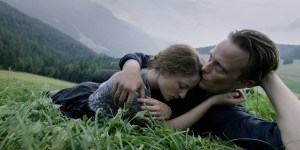
A Hidden Life is a lush and beautiful rendering of a simple act of resistance in wartime anschluss Austria. It’s directed by Terrance Mallick, and is instantly recognizable by its swirling images, breathy voiceovers, lush music and stunning camerawork. People clutch earth in their fingers, and reap fields with scythes. Good passionate acting, featuring cameo performances by Matthias Schoenaerts, Franz Rogowski, and the late, great Bruno Ganz.
On the other hand… it’s three hours long. Three hours! Why does it take so long to tell such a simple story? Why? It’s not exactly boring or tedious since it’s done so beautifully, but similar stories have already been told (and in a more dramatic fashion, like Oliver Hirschbiegel’s 13 Minutes/Elser – Er hätte die Welt verändert). As a movie critic, I try to avoid terms like “self-indulgent”, but this movie is strictly for fans of Terrence Mallick.
Dir: Tom Hooper
It’s nighttime in a fantastical, pre-gentrified London, where abandoned alley cats rule the streets. The Jellicle Cats are gathered for their annual meeting, presided over by Old Deuteronomy (Judy Dench), who will choose one cat to be reborn. Each contestant performs before the queen: There are dancers (Francesca Hayward, Steven McRae) singers (Taylor Swift, Jennifer Hudson), comics (Rebel Wilson, James Corden), a  magician dressed in black and white (Laurie Davidson) and even an old theatre cat (Ian McKellen). But the age-old ceremony is challenged by the evil Macavity (Idris Elba) who is kidnapping each cat after their performance. Who will be chosen to ascend to the skies? Will peace and order return to the Jellicle cats? And can newbie Victoria join the gang?
magician dressed in black and white (Laurie Davidson) and even an old theatre cat (Ian McKellen). But the age-old ceremony is challenged by the evil Macavity (Idris Elba) who is kidnapping each cat after their performance. Who will be chosen to ascend to the skies? Will peace and order return to the Jellicle cats? And can newbie Victoria join the gang?
Cats is a strange hybrid of theatre, and movie special effects. Each act is performed on a vast soundstage, keeping close to how it would look before a live  audience. The cat people’s faces and bodies are human, but augmented, using CGI, with cat ears, moving tails and furry bodies. Some of them wear elaborate costumes, while others run around “naked”, covered in sleek fur. But they’ve all been digitally neutered, with no sign of breasts or genitals anywhere. The script is abysmally bad, almost babyish, with “jokes” like cat got your tongue? and relentless fat jokes. Fat jokes? Really?
audience. The cat people’s faces and bodies are human, but augmented, using CGI, with cat ears, moving tails and furry bodies. Some of them wear elaborate costumes, while others run around “naked”, covered in sleek fur. But they’ve all been digitally neutered, with no sign of breasts or genitals anywhere. The script is abysmally bad, almost babyish, with “jokes” like cat got your tongue? and relentless fat jokes. Fat jokes? Really?
Music ranges from torch songs to chorus lines. There are a few great scenes, like cockroaches  doing elaborate Busby Berkeley formations as Rebel Wilson eats them, one by one; and impressive dance routines, along with some good songs… but I can’t figure out who the movie is trying to appeal to? Small children? Theatre buffs? Taylor Swift fans? I don’t think it knows, either.
doing elaborate Busby Berkeley formations as Rebel Wilson eats them, one by one; and impressive dance routines, along with some good songs… but I can’t figure out who the movie is trying to appeal to? Small children? Theatre buffs? Taylor Swift fans? I don’t think it knows, either.
Still… I kinda liked it, if just for the spectacle of it all. It’s bad, but it’s watchable and loaded with great singers dancers and prize-winning actors all of whom are far, far more talented than the material they’ve been given.
And I think these weird cat people will haunt my sexual nightmares for years to come.
Bombshell, A Hidden Life and Cats all open today in Toronto; check your local listings.
This is Daniel Garber at the Movies, each Friday morning, on CIUT 89.5 FM and on my website, culturalmining.com.
Films Reviewed: The Body Remembers When the World Broke Open, Marriage Story, 63 Up
Hi, this is Daniel Garber at the Movies for culturalmining.com and CIUT 89.5 FM.
How much of our lives are changed by free will, and how much is predetermined by fate, class or outside circumstances? This week I’m looking at three films about people affected by changes they didn’t plan on. There’s two indigenous women thrown together, a married couple torn apart, and fourteen people following divergent pathways in their lives.
 The Body Remembers When the World Broke Open
The Body Remembers When the World Broke Open
Wri/Dir: Kathleen Hepburn, Elle-Máijá Tailfeathers
Rosie (Violet Nelson) is a pregnant young woman who lives with her boyfriend and his mom in Vancouver’s East End. She likes tie dye hoodies and watching TV. Alia (Elle-Máijá Tailfeathers) is a middle class woman debating whether she’s ready for a child with her partner. The two meet at random on a sidewalk, Alia emerging from an alienating medical procedure, Rosie from a violent incident at home. Her boyfriend attacked her, leaving on a daze, with a bruised face, barefoot and pregnant, standing in the rain. Alia dismisses her own problems and concentrates on getting a safe sheltered space for the woman she has just met. They are both indigenous women, but do they have anything else in common? Or are they just ships passing in the dark?
The Body Remembers as the World Broke Open is a very moving, personal drama about two women, and how their  lives briefly intersect. They are followed with a handheld camera, and the movie takes place in real time, without breaks, as if you are there with them. It explores differences of class and appearance – Alia can pass for white – and all that carries: violence and abuse, and how police behaviour depends on the appearance of a victim. This is an amazing depiction of a multifaceted urban indigenous story told from the characters ownpoints of view. It takes you on a heartfelt journey even as it destroys common stereotypes. Great acting, a realistic script and an urgent, constantly-moving style keeps you on edge the entire time.
lives briefly intersect. They are followed with a handheld camera, and the movie takes place in real time, without breaks, as if you are there with them. It explores differences of class and appearance – Alia can pass for white – and all that carries: violence and abuse, and how police behaviour depends on the appearance of a victim. This is an amazing depiction of a multifaceted urban indigenous story told from the characters ownpoints of view. It takes you on a heartfelt journey even as it destroys common stereotypes. Great acting, a realistic script and an urgent, constantly-moving style keeps you on edge the entire time.
I like this movie.
Wri/Dir: Noah Baumbach
Charlie and Nicole (Adam Driver, Scarlett Johansson) are a happily married couple in Brooklyn. He’s originally from the midwest and she’s from LA, but they both think of New York as their home. He’s a theatre director with a show headed for Broadway, and she’s an actress featured in the plays he directs. But when she heads to California to shoot a TV show, their perfect marriage turns out to be not so perfect. Turns out they haven’t slept together in a year, and Charlie is having an affair with another actress from within their own theatre. And now their living on opposite coasts of the country. Still, Charlie is shocked and devastated when Nicole tells him she’s staying in LA, with their son, and filing for divorce. Can their marriage be saved? Should it be? What will happen to their careers? The broadway show? And who will stay with their son.
Marriage Story is a compact film about a relationship falling  apart. It follows the characters – along with her family and their son – as it turns from a disagreement to a fight to a legal battle. I watched this movie not in a theatre but at home on Netflix. The problem with home viewing is that you can turn it off halfway through and come back later, something you can’t do in a movie theatre. That’s what happened to me. I was bored and distracted for the first half-hour, and didn’t want to sit through a happy and successful family’s divorce. It was irritating, annoying. Charlie is an entitled, selfish doofus, while Nicole can’t take responsibility for her own actions, pinning it all on him.
apart. It follows the characters – along with her family and their son – as it turns from a disagreement to a fight to a legal battle. I watched this movie not in a theatre but at home on Netflix. The problem with home viewing is that you can turn it off halfway through and come back later, something you can’t do in a movie theatre. That’s what happened to me. I was bored and distracted for the first half-hour, and didn’t want to sit through a happy and successful family’s divorce. It was irritating, annoying. Charlie is an entitled, selfish doofus, while Nicole can’t take responsibility for her own actions, pinning it all on him.
But I later returned to watch the rest… and I am so glad I did. It turns into a fantastic, subtle portrayal of a loving couple torn apart by their own actions and a legal system that leaves them scrambling. It also becomes almost a brilliant musical, in which both characters (in separate, plausible settings), break into Sondheim songs to explain their situations to their friends and families. Driver and Johannsson are both excellent and believable in their roles and their lawyers (Laura Dern, Ray Liotta, Alan Alda) provide a sharp and cynical counterpoint the couple’s real emotions.
Dir: Michael Apted
“Give me the child at age seven and I’ll show you the man.” That’s how a segment called Seven Up began on a UK current affairs show in the early 60s. 14 children were brought together on a playground and interviewed on camera. Upper class boys in line for elite public schools and then on to Oxford or Cambridge and the seats of power. Working class kids from London’s east end; a couple from the North, one from a farm, and two taken from a “Home for Boys”, an orphanage-like institution. The short piece wondered what  will become of these post-war baby-boomers as the world
will become of these post-war baby-boomers as the world
changes? Seven years later a young Michael Apted took on the responsibility and followed them every seven years with a new film looking at what has become of them. Each successive version surprises and delights audiences who wonder what has happened to these kids – now adults – as they gradually age: their opinions on relationships and politics, whether they have transcended their class or background, what are their hopes, and later, what are their regrets.
 63 Up is a fascinating study, almost the only one of its kind, that traces a generation throughout their lives. It began in a very different era, when class is all-important, while gender or ethnicity are afterthoughts and sexuality never mentioned. Since there were only three girls in the initial show, three women it remains, and in the early years they are asked domestic questions, nothing about politics, or professional goals. But the subjects end up having
63 Up is a fascinating study, almost the only one of its kind, that traces a generation throughout their lives. It began in a very different era, when class is all-important, while gender or ethnicity are afterthoughts and sexuality never mentioned. Since there were only three girls in the initial show, three women it remains, and in the early years they are asked domestic questions, nothing about politics, or professional goals. But the subjects end up having  fascinating lives. One emigrates to Australia, another follows an academic path to an American professorship. Others stay close to home. And two subjects face death. One of the most endearing stories follows a man troubled by depression whose life takes a surprising turn. And for all of them, the series both keeps track of their lives and affects them as they become public figures, almost celebrities, in a largely private world… before social networking made everyone’s lives common currency.
fascinating lives. One emigrates to Australia, another follows an academic path to an American professorship. Others stay close to home. And two subjects face death. One of the most endearing stories follows a man troubled by depression whose life takes a surprising turn. And for all of them, the series both keeps track of their lives and affects them as they become public figures, almost celebrities, in a largely private world… before social networking made everyone’s lives common currency.
The Body Remembers When the World Broke Open starts today at the TIFF Bell Lightbox and Marriage Story continues there and on Netflix; and 63 Up starts next Friday at the Hot Docs Cinema.
This is Daniel Garber at the Movies, each Friday morning, on CIUT 89.5 FM and on my website, culturalmining.com.
Daniel Garber talks with producer Robert Lantos about The Song of Names
 Hi, this is Daniel Garber at the Movies for culturalmining.com and CIUT 89.5 FM.
Hi, this is Daniel Garber at the Movies for culturalmining.com and CIUT 89.5 FM.
Photo of Robert Lantos by Jeff Harris.
Martin is an aspiring youg musician, the only son of a concert impresario in prewar London. Then Dovidl, a Jewish-Polish boy his age – who is also a violin prodigy – is left in the care of his family. As war rages across Europe, the two boys grow up together, first as rivals, best friends and almost like brothers. Then, on the evening of his solo debut in a sold out concert, Dovidl just disappears. Where has he gone, Is he living or dead, will Martin ever see him again, and what is this “Song of Names” that may be the reason behind his  disappearance?
disappearance?
The Song of Names is the title of a new film that looks at identity, family, friendship, memory, and mourning. It’s directed by Francois Girard, stars Tim Roth and Clive Owen, and its producer is Robert Lantos.
Robert Lantos is one of Canada’s most famous producers – he founded and ran Alliance Communications and later Serendipity Point Films. His production credits are a veritable history of Canadian cinema: Atom Egoyan’s Exotica and The Sweet Hereafter; David Cronenberg’s Eastern Promises; Jeremy Podeswa’s Fugitive Pieces, Istvan Szabo’s Sunshine; an adaptation of Mordechai Richler’s Barney’s Version, among many many others.
I spoke with Robert Lantos in studio at CIUT 89.5 FM.
The Song of Names opens in Toronto, Montreal and Vancouver on Christmas Day.
Daniel Garber talks with filmmaker Sophie Deraspe about Antigone
 Hi, this is Daniel Garber at the Movies for culturalmining.com and CIUT 89.5 FM.
Hi, this is Daniel Garber at the Movies for culturalmining.com and CIUT 89.5 FM.
Photos by Jeff Harris.
Antigone is a straight-A high school student in Montreal. She lives with two brothers and a sister, raised by ther grandmother. They immigrated from North Africa when she was still a child. She’s heading for university and is dating Hémon, the son of a prominent politician. But her normal life is shattered when the  police kill one brother and jail the other. She comes up with a scheme to take her brothers place in prison. But what will become of Antigone?
police kill one brother and jail the other. She comes up with a scheme to take her brothers place in prison. But what will become of Antigone?
Antigone is the title of a fantastic new film from Québec, about a strong young woman willing to confront the government and risk everything for the love of her brother. The film transplants the classic Greek play into  modern day Montréal, incorporating contemporary cinema, drama, literature, and music. The film is written and directed by Sophie Deraspe who also served as cinematographer and editor. Antigone is her first feature and has won countless prizes, including best Canadian Film at TIFF and is Canada’s choice for Best Foreign Film Oscar.
modern day Montréal, incorporating contemporary cinema, drama, literature, and music. The film is written and directed by Sophie Deraspe who also served as cinematographer and editor. Antigone is her first feature and has won countless prizes, including best Canadian Film at TIFF and is Canada’s choice for Best Foreign Film Oscar.
I spoke with Sophie at CIUT 89.5 FM.
Antigone opens today in Toronto.
Mums and their sons. Films reviewed: Code 8, Brotherhood, In Fabric
Hi, this is Daniel Garber at the Movies for culturalmining.com and CIUT 89.5 FM.
This week I’m looking at three movies about mums and their sons. There’s a historical drama about fatherless boys facing disaster at summer camp; a sci-fi action/thriller about a guy with secret powers and a dying mom; and a retro horror movie about a divorced mom and her sinister red dress.
Dir: Jeff Chan
It’s the future, a dystopian America patrolled by drones that terrorize ordinary people in the war on drugs. Conner (Robbie Amell) is a young guy livng with his mom in a big city. He’s a day labourer who does pickup construction work for cash, while she stocks shelves at a corner grocery store. They’re in debt and can’t pay their bills. Worse than that, his mom (Kari Matchett) needs medical care… badly. She  has a science-fictiony disease that has you bleed fluorescent blue gunk, but they can’t afford the treatment. What can they do?
has a science-fictiony disease that has you bleed fluorescent blue gunk, but they can’t afford the treatment. What can they do?
Opportunity knocks when a criminal named Garrett (Stephen Amell) hires him to help with a job. He needs someone with high level electrical skills… and he doesn’t mean wiring. Conner is a guy with special powers – he can shortcircuit a generator with his bare hands. But in this world, mutants are kept down by the cops and forced to take menial jobs. So it’s poverty or a life of crime. His mother raised him to be honest and hide his powers, but he needs to cure her illness. If he can help the criminals secure the scarce narcotic  Psyke – made from human spinal fluid – maybe they’ll give him the cure his mom so desperately needs.
Psyke – made from human spinal fluid – maybe they’ll give him the cure his mom so desperately needs.
Code 8 is a fast-moving action-thriller about a future world where power is shared by corrupt cops and organized criminals. It was shot in Toronto, with recognizable locations – Regent Park! – in many scenes. Good special effects and music, and recognizable actors – Stephen Amell is TVs The Arrow, and Robbie Amell his real-life cousin. (Sung Kang co-stars as a good cop). I enjoyed this movie, but I gotta say: Code 8 feels more like the pilot for an upcoming TV series than a one-off movie.
Wri/Dir: Richard Bell
It’s the summer of ’26 in Ontario’s cottage country. Arthur Lambdon (Brendan Fletcher) is a WWI vet who lost his wife and kid to the Spanish Flu. He’s a counsellor alongside Mr Butcher (Brendan Fehr) who walks with a cane. He busted up his leg in the war. They’re at a summer camp for fatherless teens on placid Lake Balsam in the Kawarthas to provide leadership role models. And the kids there are really into it. There’s a whole crew of eager kids: Waller (Jack Manley) the quick-to-anger alpha dog; brothers Jack and Will who are always fighting, one kid with a runny nose – I’m allergic to trees! – , and another who likes to sing dirty camp songs. They are all very excited by an  upcoming trip across the lake in a long, war canoe that can fit them all.
upcoming trip across the lake in a long, war canoe that can fit them all.
But once they reach the middle of the lake disaster strikes in the form of a freak summer storm. Heavy winds roil the waters and capsize the boat. Someare lost and the rest forced to spend the night, in the dark, in the cold water, taking turns hanging onto the upsidedown canoe. Who will survive the night? And who will make it back to shore?
Brotherhood is a well-made look at a real-life tragedy from the distant past. It has all the right period costumes, authentic language and historical details, beautifully photographed panoramas of scenic lakes… The problem is I just couldn’t connect with any of the characters. There was nothing surprising or intriguing about the story – you know from the start that they will drown. In fact, most of the movie is a self-imposed spoiler, a series of flashbacks leading up to the inevitable accident, as seen through the opaque eyes of uninteresting Arthur. It’s based on a true story (in real life the victims were as young as 6, not all teenagers like they are in the movie), but, perhaps because of its suspense-free method of storytelling, this tragic movie didn’t pluck a single heart string.
Wri/Dir: Peter Strickland
It’s London, in the 1970s. Sheila (Marianne Jean-Baptiste: Secrets & Lies) is a middle-aged divorced woman, who lives with her adult son, a student. She works full time but wants more out of life. So she’s preparing for a blind date with a gentleman she met through the Lonelyhearts column in the newspaper classifieds. She wants it to be a night to remember so she stops by an exclusive women’s store to buy a dress. There she’s greeted by Miss Luckmoore (Fatma Mohamed) an enigmatic saleswoman with pointy red nails, dramatic black hair and an uncanny way if speaking. She insists Sheila buy only the best, a blood-red satin dress with a plunging neckline. It’s a one of a kind, Miss Luckmoore says, and despite being the wrong  size (“size 36”), it fits Sheila like a glove. Her date is less than elegant – a chips-and-kebab house – but the dress takes on an increasing importance. It leaves strange marks on her body, inspires horrible nightmares, and leads to increasingly awful incidents – like the dress had a mind if it’s own. Is it just her imagination or is it trying to kill her?
size (“size 36”), it fits Sheila like a glove. Her date is less than elegant – a chips-and-kebab house – but the dress takes on an increasing importance. It leaves strange marks on her body, inspires horrible nightmares, and leads to increasingly awful incidents – like the dress had a mind if it’s own. Is it just her imagination or is it trying to kill her?
In Fabric is a bizarre, haunting horror film, with loads of dark comedy, stylized violence and perverse sex. Sheila’s story intertwines  with that of Reg Speaks (Leo Bill) a newly-married washing machine repairman (and other side plots) all centred on that insidious, satanic red dress and the witch-like saleswoman who controls it. With its intentionally stilted dialogue, amazing production design, jarring editing, brilliantly spooky music, and perfect deadpan acting, In Fabric is like nothing you’ve ever seen before (unless you’ve seen Peter Strictland’s other movies.) It’s disturbing, and you may wonder what the hell is going on, but if you like art, sound, design and fashion; if you like horror/comedy without too much gore, this avant garde film is a must-see.
with that of Reg Speaks (Leo Bill) a newly-married washing machine repairman (and other side plots) all centred on that insidious, satanic red dress and the witch-like saleswoman who controls it. With its intentionally stilted dialogue, amazing production design, jarring editing, brilliantly spooky music, and perfect deadpan acting, In Fabric is like nothing you’ve ever seen before (unless you’ve seen Peter Strictland’s other movies.) It’s disturbing, and you may wonder what the hell is going on, but if you like art, sound, design and fashion; if you like horror/comedy without too much gore, this avant garde film is a must-see.
In Fabric (at the TIFF Bell Lightbox), Code 8, and Brotherhood all open today in Toronto; check your local listings.
This is Daniel Garber at the Movies, each Friday morning, on CIUT 89.5 FM and on my website, culturalmining.com.

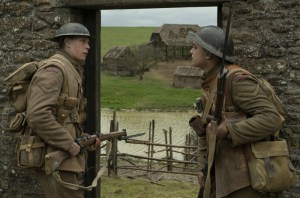


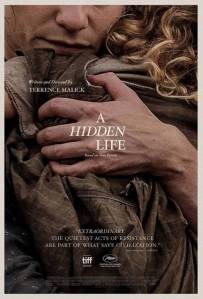
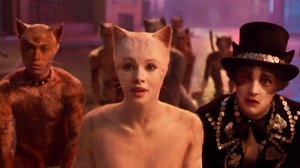

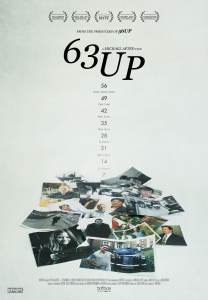

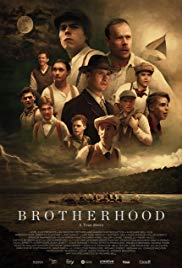
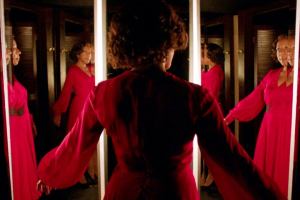
leave a comment